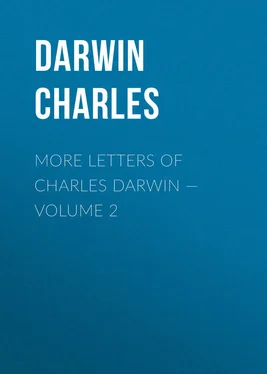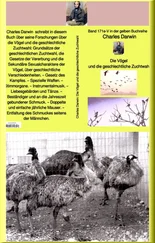Charles Darwin - More Letters of Charles Darwin — Volume 2
Здесь есть возможность читать онлайн «Charles Darwin - More Letters of Charles Darwin — Volume 2» — ознакомительный отрывок электронной книги совершенно бесплатно, а после прочтения отрывка купить полную версию. В некоторых случаях можно слушать аудио, скачать через торрент в формате fb2 и присутствует краткое содержание. Жанр: foreign_antique, foreign_prose, на английском языке. Описание произведения, (предисловие) а так же отзывы посетителей доступны на портале библиотеки ЛибКат.
- Название:More Letters of Charles Darwin — Volume 2
- Автор:
- Жанр:
- Год:неизвестен
- ISBN:нет данных
- Рейтинг книги:5 / 5. Голосов: 1
-
Избранное:Добавить в избранное
- Отзывы:
-
Ваша оценка:
- 100
- 1
- 2
- 3
- 4
- 5
More Letters of Charles Darwin — Volume 2: краткое содержание, описание и аннотация
Предлагаем к чтению аннотацию, описание, краткое содержание или предисловие (зависит от того, что написал сам автор книги «More Letters of Charles Darwin — Volume 2»). Если вы не нашли необходимую информацию о книге — напишите в комментариях, мы постараемся отыскать её.
More Letters of Charles Darwin — Volume 2 — читать онлайн ознакомительный отрывок
Ниже представлен текст книги, разбитый по страницам. Система сохранения места последней прочитанной страницы, позволяет с удобством читать онлайн бесплатно книгу «More Letters of Charles Darwin — Volume 2», без необходимости каждый раз заново искать на чём Вы остановились. Поставьте закладку, и сможете в любой момент перейти на страницу, на которой закончили чтение.
Интервал:
Закладка:
LETTER 464. TO W. BOWMAN.
(464/1. The late Sir W. Bowman, the well-known surgeon, supplied a good deal of information of value to Darwin in regard to the expression of the emotions. The gorging of the eyes with blood during screaming is an important factor in the physiology of weeping, and indirectly in the obliquity of the eyebrows — a characteristic expression of suffering. See "Expression of the Emotions," pages 160 and 192.)
Down, March 30th {1868}.
I called at your house about three weeks since, and heard that you were away for the whole month, which I much regretted, as I wished to have had the pleasure of seeing you, of asking you a question, and of thanking you for your kindness to my son George. You did not quite understand the last note which I wrote to you — viz., about Bell's precise statement that the conjunctiva of an infant or young child becomes gorged with blood when the eyes are forcibly opened during a screaming fit. (464/2. Sir C. Bell's statement in his "Anatomy of Expression" (1844, page 106) is quoted in the "Expression of the Emotions," page 158.) I have carefully kept your previous note, in which you spoke doubtfully about Bell's statement. I intended in my former note only to express a wish that if, during your professional work, you were led to open the eyelids of a screaming child, you would specially observe this point about the eye showing signs of becoming gorged with blood, which interests me extremely. Could you ask any one to observe this for me in an eye-dispensary or hospital? But I now have to beg you kindly to consider one other question at any time when you have half an hour's leisure.
When a man coughs violently from choking or retches violently, even when he yawns, and when he laughs violently, tears come into the eyes. Now, in all these cases I observe that the orbicularis muscle is more or less spasmodically contracted, as also in the crying of a child. So, again, when the muscles of the abdomen contract violently in a propelling manner, and the breath is, I think, always held, as during the evacuation of a very costive man, and as (I hear) with a woman during severe labour-pains, the orbicularis contracts, and tears come into the eyes. Sir J.E. Tennant states that tears roll down the cheeks of elephants when screaming and trumpeting at first being captured; accordingly I went to the Zoological Gardens, and the keeper made two elephants trumpet, and when they did this violently the orbicularis was invariably plainly contracted. Hence I am led to conclude that there must be some relation between the contraction of this muscle and the secretion of tears. Can you tell me what this relation is? Does the orbicularis press against, and so directly stimulate, the lachrymal gland? As a slight blow on the eye causes, by reflex action, a copious effusion of tears, can the slight spasmodic contraction of the orbicularis act like a blow? This seems hardly possible. Does the same nerve which runs to the orbicularis send off fibrils to the lachrymal glands; and if so, when the order goes for the muscle to contract, is nervous force sent sympathetically at the same time to the glands? (464/3. See "Expression of the Emotions," page 169.)
I should be extremely much obliged if you {would} have the kindness to give me your opinion on this point.
LETTER 465. TO F.C. DONDERS.
(465/1. Mr. Darwin was indebted to Sir W. Bowman for an introduction to Professor Donders, whose work on Sir Charles Bell's views is quoted in the "Expression of the Emotions," pages 160-62.)
Down, June 3rd {1870?}.
I do not know how to thank you enough for the very great trouble which you have taken in writing at such length, and for your kind expressions towards me. I am particularly obliged for the abstract with respect to Sir C. Bell's views (465/2. See "Expression of the Emotions," pages 158 et seq.: Sir Charles Bell's view is that adopted by Darwin — viz. that the contraction of the muscles round the eyes counteracts the gorging of the parts during screaming, etc. The essay of Donders is, no doubt, "On the Action of the Eyelids in Determination of Blood from Expiratory Effort" in Beale's "Archives of Medicine," Volume V., 1870, page 20, which is a translation of the original in Dutch.), as I shall now proceed with some confidence; but I am intensely curious to read your essay in full when translated and published, as I hope, in the "Dublin Journal," as you speak of the weak point in the case — viz., that injuries are not known to follow from the gorging of the eye with blood. I may mention that my son and his friend at a military academy tell me that when they perform certain feats with their heads downwards their faces become purple and veins distended, and that they then feel an uncomfortable sensation in their eyes; but that as it is necessary for them to see, they cannot protect their eyes by closing the eyelids. The companions of one young man, who naturally has very prominent eyes, used to laugh at him when performing such feats, and declare that some day both eyes would start out of his head.
Your essay on the physiological and anatomical relations between the contraction of the orbicular muscles and the secretion of tears is wonderfully clear, and has interested me greatly. I had not thought about irritating substances getting into the nose during vomiting; but my clear impression is that mere retching causes tears. I will, however, try to get this point ascertained. When I reflect that in vomiting (subject to the above doubt), in violent coughing from choking, in yawning, violent laughter, in the violent downward action of the abdominal muscle...and in your very curious case of the spasms (465/3. In some cases a slight touch to the eye causes spasms of the orbicularis muscle, which may continue for so long as an hour, being accompanied by a flow of tears. See "Expression of the Emotions," page 166.) — that in all these cases the orbicular muscles are strongly and unconsciously contracted, and that at the same time tears often certainly flow, I must think that there is a connection of some kind between these phenomena; but you have clearly shown me that the nature of the relation is at present quite obscure.
LETTER 466. TO A.D. BARTLETT. 6, Queen Anne Street, W., December 19th {1870?}.
I was with Mr. Wood this morning, and he expressed himself strongly about your and your daughter's kindness in aiding him. He much wants assistance on another point, and if you would aid him, you would greatly oblige me. You know well the appearance of a dog when approaching another dog with hostile intentions, before they come close together. The dog walks very stiffly, with tail rigid and upright, hair on back erected, ears pointed and eyes directed forwards. When the dog attacks the other, down go the ears, and the canines are uncovered. Now, could you anyhow arrange so that one of your dogs could see a strange dog from a little distance, so that Mr. Wood could sketch the former attitude, viz., of the stiff gesture with erected hair and erected ears. (466/1. In Chapter II. of the "Expression of the Emotions" there are sketches of dogs in illustration of the "Principle of Antithesis," drawn by Mr. Riviere and by Mr. A. May (figures 5-8). Mr. T.W. Wood supplied similar drawings of a cat (figures 9, 10), also a sketch of the head of a snarling dog (figure 14).) And then he could afterwards sketch the same dog, when fondled by his master and wagging his tail with drooping ears. These two sketches I want much, and it would be a great favour to Mr. Wood, and myself, if you could aid him.
P.S. — When a horse is turned out into a field he trots with high, elastic steps, and carries his tail aloft. Even when a cow frisks about she throws up her tail. I have seen a drawing of an elephant, apparently trotting with high steps, and with the tail erect. When the elephants in the garden are turned out and are excited so as to move quickly, do they carry their tails aloft? How is this with the rhinoceros? Do not trouble yourself to answer this, but I shall be in London in a couple of months, and then perhaps you will be able to answer this trifling question. Or, if you write about wolves and jackals turning round, you can tell me about the tails of elephants, or of any other animals. (466/2. In the "Expression of the Emotions," page 44, reference is made under the head of "Associated habitual movements in the lower animals," to dogs and other animals turning round and round and scratching the ground with their fore-paws when they wish to go to sleep on a carpet, or other similar surface.)
Читать дальшеИнтервал:
Закладка:
Похожие книги на «More Letters of Charles Darwin — Volume 2»
Представляем Вашему вниманию похожие книги на «More Letters of Charles Darwin — Volume 2» списком для выбора. Мы отобрали схожую по названию и смыслу литературу в надежде предоставить читателям больше вариантов отыскать новые, интересные, ещё непрочитанные произведения.
Обсуждение, отзывы о книге «More Letters of Charles Darwin — Volume 2» и просто собственные мнения читателей. Оставьте ваши комментарии, напишите, что Вы думаете о произведении, его смысле или главных героях. Укажите что конкретно понравилось, а что нет, и почему Вы так считаете.












